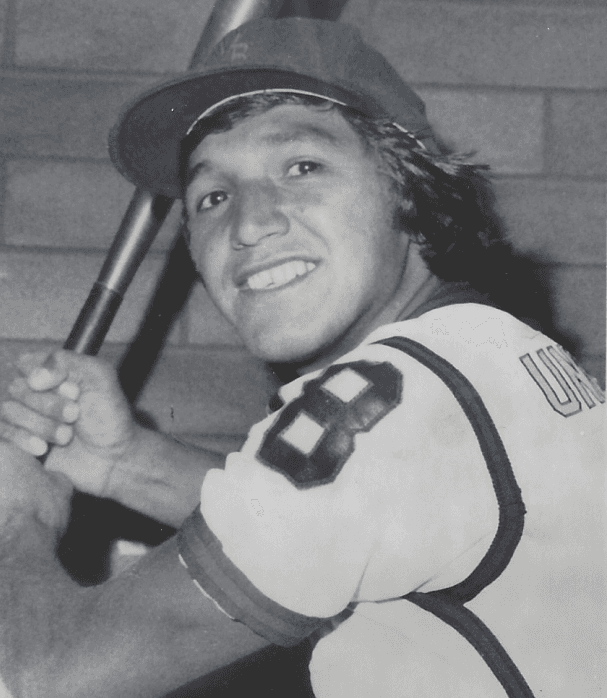Circle of champions
WELCOME TO THE
CIRCLE OF CHAMPIONS
The Indigenous athletes and teams featured here in the Circle of Champions have each been inducted into the BC Sports Hall of Fame, considered the highest honour in BC sport. As the Indigenous Sport Gallery came to fruition, it became clear that the stories of Indigenous athletes and their accomplishments have been historically overlooked and have not been celebrated properly. The Circle of Champions, along with the entire Indigenous Sport Gallery, hopes to play a part in amplifying these stories and these athletes and teams as a crucial part of BC sports history. We hope that this will serve as inspiration to future generations of Indigenous athletes who could one day be inducted into the BC Sports Hall of Fame.



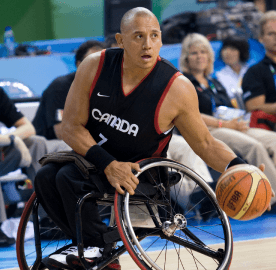

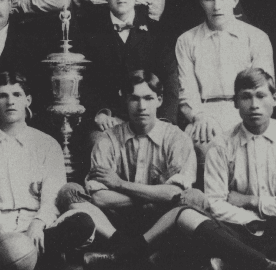


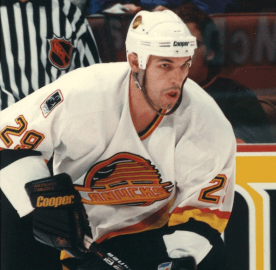


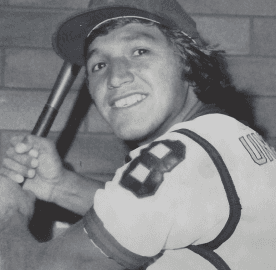
Terry Fox (1958-1981) - Métis
In March of 1977, Terry was diagnosed with osteogenic sarcoma, a type of bone cancer. In hopes of having the highest chance of survival, doctors decided to amputate Terry’s right leg above the knee which was followed by a 16-month chemotherapy program. During this time Terry started playing wheelchair basketball with the Vancouver Cable Cars and training for his cross-country run. By April of 1980, Terry had run over 5,000km and was ready to start his Marathon of Hope. On April 12, 1980, Terry started by dipping his leg in the Atlantic Ocean near St. John’s, Newfoundland. Unfortunately, due to the cancer spreading to his lungs, Terry had to stop the Marathon of Hope in Thunder Bay, Ontario on September 1, 1980. Terry’s ongoing impact can be seen in the yearly Terry Fox Run which has raised more than $850 million towards cancer research since 1980.
Terry, one of Canada’s most beloved athletes, grew up unaware of his family’s Indigenous ancestry. After Terry’s grandmother, Marian Gladue, passed away in 2001 the family began to explore their Métis ancestry, tracing their roots to the Red River Valley in Manitoba. In 2014, Métis Nation BC posthumously awarded Terry the Order of the Sash for his contributions, sacrifices, commitment, and service to Canada. During the 2017 Toronto North American Indigenous Games closing ceremonies, Terry’s brother Darrell shared the story of their grandmother. Today, the Fox family is proud of their Métis heritage. Darrell Fox and his daughter are officially recognized members of the Métis Nation.
Induction Information
Induction Year: 1980
Category: W.A.C Bennett Award
Sport: Athletics

Angela Chalmers - Birdtail Sioux Dakota Nation
Angela is a member of the Birdtail Sioux Dakota Nation and from 1985-1994 she was considered among the best middle distance runners in the world. Angela started running by racing her brothers and went on to run for Neelin High School in Brandon, Manitoba and became an eight time All-American at Northern Arizona University in track and cross country. Angela’s first international medal came when she won bronze in the 3,000m at the 1985 World University Games in Kobe, Japan. Building on her international success, Angela claimed double gold medals at the Commonwealth Games in Auckland, New Zealand in the 1500m and 3000m. Though she was eliminated in the semi-finals of the 1500m race at the 1992 Olympic Games in Barcelona, Spain, Angela fulfilled a promise to her father, who had passed away in 1984, by winning a bronze medal in the 3000m. At the 1994 Commonwealth Games in her adopted hometown of Victoria she was chosen as Canada’s opening ceremony flag bearer. Angela would go on to win her second gold medal in the 3000m, setting a Canadian national and Commonwealth Games record with a time of 8:32:17.
Throughout her career Angela has served as an inspiration and role model for Indigenous youth, visiting and speaking to Indigenous communities across Canada to talk about her experience with sport. In 1995, Angela won the National Aboriginal Achievement Award (Indspire Award) for her contributions to sport. After retiring from athletics, Angela married Australian middle distance runner Simon Doyle and moved to Australia in 2000.
Induction Information
Induction Year: 1980
Category: W.A.C Bennett Award
Sport: Athletics

Alex Nelson / Ok’wilagame - Musgamagw Dzawada’enuxw Tribal Council
Alex is a member of the Musgamagw Dzawada’enuxw Tribal Council, a Kwak’wala speaking people whose traditional villages include Gwayee (Kingcome Inlet) and Gwayasdums (Gilford Island). Forced into Residential School at age seven, soccer was Alex’s saving grace and provided a bright spot in his daily routine. Alex developed a passion for sport and wanted to share the power of sport with Indigenous peoples across Canada, specifically youth. In 1989, he helped found the Aboriginal Sports and Recreation Association of BC, Canada’s first provincial Indigenous sport body and served as executive director until 2009. Alex has been involved with the North American Indigenous Games (NAIG) since the inaugural Games in 1990. As a three-time president of NAIG, Alex led the bid process for the 1997 NAIG in Victoria. With a short time frame of two years and a slim budget of $2.5 million, Alex led the planning of the Games which resulted in 5,000 participants competing in 16 sports, 3,000 participants in the cultural activations, and involved over 2,500 volunteers. In addition to work, Alex has been coaching soccer for the last 40+ years, helping grow the Victoria T-Bird Soccer Club to include divisions for men, women, and youth.
Alex now resides in Victoria with his wife, daughter and grandsons and is still active in the Indigenous sport community, currently the Elder and Senior Advisor to the Indigenous Sport, Physical Activity, and Recreation Council. Actively serving as an inspiration to the next generation of athletes, Alex has proven the importance of sport and continues to play soccer to this day.
Induction Information
Induction Year: 1980
Category: W.A.C Bennett Award
Sport: Athletics

Richard Peter - Cowichan Tribes
Growing up in Duncan, Richard is a proud member of the Cowichan Tribes. After sustaining a spinal cord injury at the age of four, Richard, with the support of his family, learned how to navigate the world in a wheelchair. Growing up Richard tried every sport possible and at the age of 15 was introduced to wheelchair basketball when a touring team came to his high school as a part of wheelchair awareness week. Richard fell in love with the game and developed his skills, eventually moving to Vancouver to take his game to the next level. Debuting for the Canadian national team in 1994, Richard became an integral part of the team for almost twenty years. He is a five-time Paralympian, winning three gold medals (Sydney 2000, Athens 2004, London 2012) and one silver medal (Beijing 2008). During his wheelchair basketball career, Richard won the Tom Longboat Award for Male Indigenous Athlete of the Year twice (2000,2004). For his accomplishment to sport in Canada, Richard was awarded the National Aboriginal Achievement Award (Indspire Award) and the Queen’s Diamond Jubilee Medal in 2012.
Retiring from wheelchair basketball after the London Olympics in 2012, Richard has stayed active in the sport and advocating for access to sport for wheelchair athletes. Richard ventured into a new sport, para-badminton, utilizing his experience with wheelchair basketball to earn a spot on the Canadian national team. In 2019, Richard won a bronze medal with his partner Bernard Lapointe in para-badminton men’s doubles WH1-WH2 at the Parapan American Games in Lima, Peru. Richard currently works as the Indigenous People’s Liaison for Praxis Spinal Cord Institute.
Induction Information
Induction Year: 1980
Category: W.A.C Bennett Award
Sport: Athletics
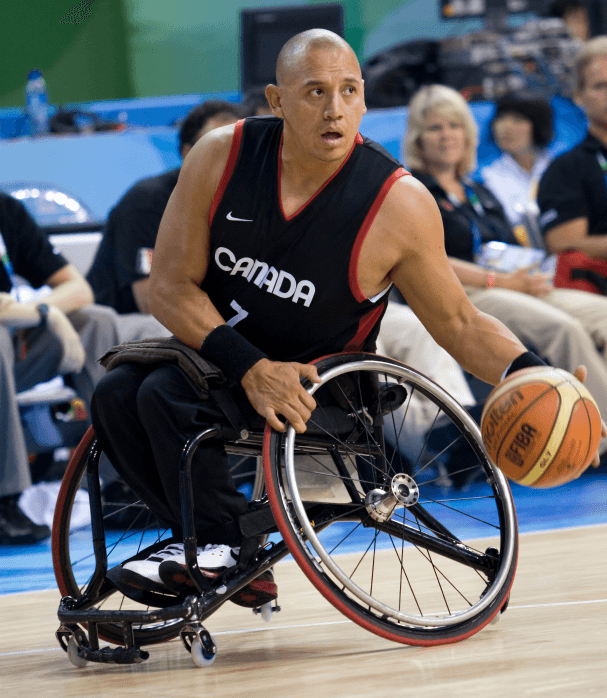
1936 North Shore Indians Lacrosse Team
The 1936 North Shore Indians were considered one of the most exciting lacrosse teams to watch in the 1930s. Coached by Andy Paull – Xwechtaal, Sḵwx̱wú7mesh Úxwumixw (Squamish Nation) leader, activist, and legal expert, the team made up of members from the Sḵwx̱wú7mesh Úxwumixw and Six Nations of the Grand River, many of which were family. The style of play with high velocity passes and shots thrilled spectators and led the team to high levels of success. The team ended the regular season with a 16-8 record, sweeping the New Westminster Salmonbellies in three games to win the Western final and secure a spot in the Mann Cup final. The North Shore Indians put up a tremendous battle against the two-time defending champion Orillia Terriers at Maple Leaf Gardens in front of 30,000 people over four games. Though the North Shore Indians fell short of winning a Mann Cup, their impact has been far greater. Descendants of the team are still actively engaged in lacrosse today, passing on the love of the sport and style of play to future generations of athletes. Today the North Shore Indians play in the West Coast Senior Lacrosse Association, wearing the emblem of the team who inspired generations of Indigenous lacrosse players across British Columbia.
Team Members: Fred August, Dominic Baker, Frank Baker, Henry Baker, Ray Baker, Simon Baker, Ralph Band, Oscar Bomberry, Stu Bomberry, Ed Downey, Bert Hershank, Bill Huliss, Gord James, Fred Johnston, Joe Johnston, Moses Joseph, Stan Joseph, Louis Lewis, Harry Newman, Andy Paull (coach and manager), Hubie Smith, Russell Smith, Jack Squires, Gilbert Thomas, Cece VanEvery, Bill Wilkes, Bill Wilson.
Induction Information
Induction Year: 1980
Category: W.A.C Bennett Award
Sport: Athletics

Harry Manson / Xulsimalt (1879-1912) - Snuneymuxw First Nation
Harry Manson, whose traditional name Xulsimalt means one who leaves his mark, was a member of Snuneymxuw First Nation. During the late 1800s and early 1900s when oppressive policies targeted at Indigenous peoples in Canada were ramping up, Harry started to make his mark in soccer in British Columbia. Harry became the first person to play on all three Nanaimo premier soccer teams, the Nanaimo Thistles, Nanaimo Indian Wanderers, and the Nanaimo Association Football Team, contributing his speed and goal scoring ability to each. In 1898, Harry became one of the first Indigenous players, along with his teammate James Wilks, to play in the BC Provincial championship. During his career Harry faced racial abuse and discrimination on and off the field but persevered. In 1903, Harry was one of three Nanaimo Wanderers players to be selected to represent Nanaimo on an all-star team for the BC Football Association provincial championship. In the BCFA senior Challenge Cup final, Manson led the team to a 4-0 victory over Esquimalt Garrison to become the first Indigenous player to win a provincial championship.
Unfortunately, in 1912 at the age of 32 Harry was tragically killed in a train accident while on his way to get medicine for his sick infant son. Harry’s impact of breaking the racial barrier in British Columbia soccer can be seen today in the importance that soccer plays in many Indigenous communities across the province. In 2015, the Harry Manson Legacy Tournament, a five-a-side soccer tournament, was held in North Vancouver to honour Harry’s contributions and legacy.
Induction Information
Induction Year: 1980
Category: W.A.C Bennett Award
Sport: Athletics
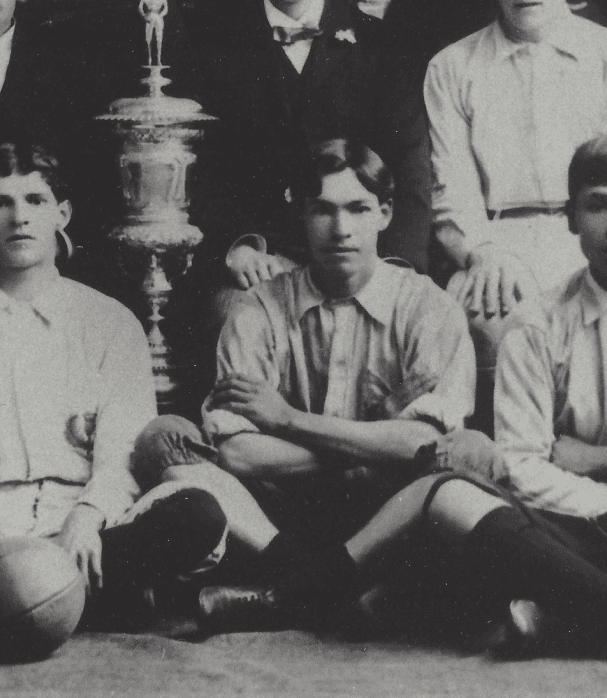
Kenny McLean (1939-2002) - Syilx Okanagan Nation
Raised in Okanagan Falls, Kenny, who had Syilx Okanagan ancestry through his mother, spent much of his childhood on a ranch near the far end of Skaha Lake. Learning how to ride horses by the age of two, breaking colts by 12, and entering his first amateur rodeo competition at 17 was only a glimpse of Kenny’s extraordinary talent. After winning the BC amateur bronc riding championship in 1958, Kenny turned pro in 1959 and immediately became a competitor in Western Canadian. Kenny won five (1959-61, 1968, 1969) Canadian saddle bronc championships becoming the first cowboy to win the title three times in a row. Kenny’s dominance was also seen in the US circuit. He competed in the Rodeo Cowboys Association, appearing in the National Finals Rodeo ten times, winning the saddle bronc riding title three times (1964, 1968, 1971). During his 77 total rides at the National Rodeo Finals, Kenny was only bucked off a total of five times. He won the Rodeo Cowboy Association’s Bill Linderman Trophy (1967, 1969) as the cowboy that demonstrated the highest level of excellence at both ends of the arena, the first Canadian to win this honour.
In the early 1970s Kenny retired from bronc riding but was still competing in other rodeo events. On July 13th, 2002, Kenny had a heart attack while in the saddle waiting for a senior roping event at a rodeo in Taber, Alberta, passing away doing what he loved. In 2010, a life-size bronze statue sculpted by Hannah Lois was unveiled in Centennial Park in Okanagan Falls, a visual representation of his impact on rodeo and his community.
Induction Information
Induction Year: 1980
Category: W.A.C Bennett Award
Sport: Athletics

Ken Moore (1910-1981) - Peepeekisis Cree First Nation
Born in Balcarres, Saskatchewan, Ken was a member of the Peepeekisis First Nation. After his two eldest brothers were forced to attend the Brandon Indian Residential School, Ken’s parents fled to Regina to save their other children from being taken to Residential School. Growing up, Ken was a multi-sport athlete, but he quickly found success in hockey. In 1931, he was an integral part of the Winnipeg Hockey Club winning the Allan Cup, which earned the team the right to represent Canada at the 1932 Winter Olympics in Lake Placid. Defeating Poland 10-0 in the gold medal game, Ken became the first Indigenous athlete to represent Canada at a Winter Olympics and the first Indigenous athlete from Canada to win an Olympic gold medal. In 1933, Ken made his way to BC, continuing his career with the Kimberly Dynamiters. He would help the Dynamiters win the 1936 Allan Cup, the first team from British Columbia to do so, and secured the teams spot to represent Canada at the 1937 World Ice Hockey Championships.
After retiring from hockey in the late 1930s, Ken stayed involved in the game through coaching and refereeing in Manitoba. Ken did not often discuss his hockey career, after his death in 1982 the family was looking through his belongings and discovered boxes of material, one of which contained his Olympic gold medal. His granddaughter, Jennifer Moore Rattray, is continuing to share her grandfather’s story and in 2023 was appointed as the Ministerial Special Representative in support of establishing a National Indigenous and Human Rights Ombudsperson.
Induction Information
Induction Year: 1980
Category: W.A.C Bennett Award
Sport: Athletics

Gino Odjick (1970-2023) - Kitigan Zibi Anishinabeg First Nation
Growing up in community on the Kitigan Zibi Anishinabeg First Nation reserve outside of Maniwaki, Quebec, Gino started playing outdoor hockey at the age of five. Coached by his dad, he began playing organized hockey at the age of 11 and quickly drew the attention of coaches at the Quebec International Pee-Wee Hockey Tournament. Becoming a physical force while playing with the Laval Titan of the Quebec Major Junior Hockey League, Gino helped the team qualify for two consecutive Memorial Cups. After Ron Delorme, Canucks scout, discovered Gino he was selected 86th in the fifth round by the Vancouver Canucks. With the team from 1990-98, Gino quickly became a fan favorite as the enforcer who gave it his all and wore his heart on his sleeve. In his debut with the team on November 21, 1990, he got into two fights and by the end of the season had accumulated 296 penalty minutes, the fourth highest in the NHL that year. During his eight seasons with the Canucks, Gino scored 47 goals, had 51 assists, and accumulated 2,127 penalty minutes, a record that still stands today.
After stints with the Philadelphia Flyers and Montreal Canadians, Gino retired from the NHL in 2002 and moved back to Vancouver where he made his home. Gino continued working with Indigenous youth, serving as an inspiration for what hard work can help you achieve. In 2014, Gino was diagnosed with AL amyloidosis, a rare terminal disease. After undergoing an experimental treatment Gino was in good health until his death in 2023. Gino’s contributions to Indigenous sport are reflected in being awarded the National Aboriginal Achievement Award (Indspire Award) in 2015 and the countless Indigenous hockey players he inspired during and after his career.
Induction Information
Induction Year: 1980
Category: W.A.C Bennett Award
Sport: Athletics
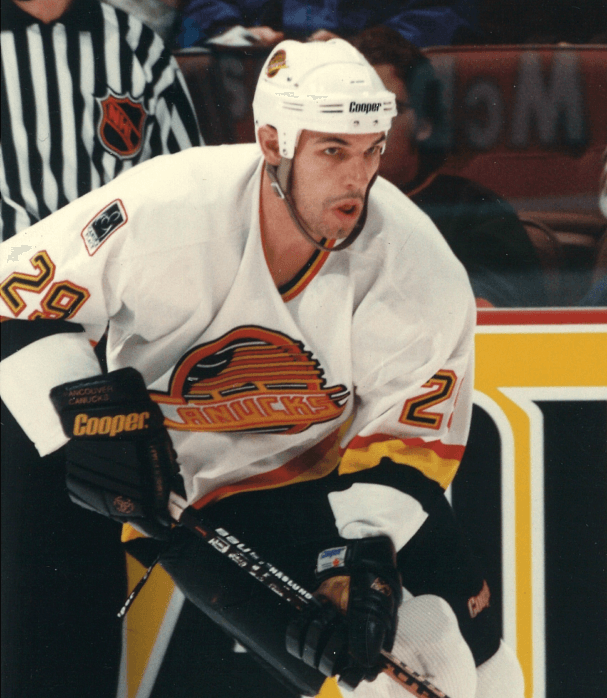
Jack Poole (1933-2009) - Métis
Born in Mortlach, Saskatchewan, Jack’s Métis heritage can be traced back six generations to 1776. While attending the University of Saskatchewan to earn a Bachelor of Science in Civil Engineering, Jack won the 1954 Universities Heavyweight Wrestling title. Jack became one of Canada’s most successful businessmen, co-founding two Vancouver based real estate development and investment companies. Best known for his role in helping to bring the Olympics to Vancouver, serving as the volunteer Chairman and Chief Executive Officer of the Vancouver 2010 Bid Corporation. After Vancouver won the bid to host at the 11th IOC Session, which was held in Prague, Czech Republic he co-chaired the 2010 Transition Committee which transitioned the business of the Bid Committee to the Vancouver 2010 Olympic and Paralympic Winter Games Organizing Committee (VANOC). Leading up to the Games, Poole was unanimously elected as chairman of the 2010 Board of Directors. For his contributions to the Games, Jack was awarded the Order of British Columbia in 2003, an Officer of the Order of Canada in 2006, National Aboriginal Achievement Award (Indspire Award) and the Order of the Sash by Métis Nation BC in 2007.
Later that same year, Jack was diagnosed with pancreatic cancer and passed away on October 23, 2009, just hours after the Olympic Flame was lit in Greece for the Vancouver torch relay. Despite Jack not seeing his efforts come to fruition, the Vancouver Winter and Paralympic Games were an astounding success and left a lasting legacy in BC sport heritage. To honour his contributions to the organization of the Games, Thurlow Plaza was renamed ‘Jack Poole Plaza’ in his memory.
Induction Information
Induction Year: 1980
Category: W.A.C Bennett Award
Sport: Athletics

Wynn Gmitroski - Métis
Born in Selkirk, Manitoba, Wynn attended Bemidji State University where he was a middle distance runner, co-captaining the track team his senior year. After attending grad school at the University of Oregon, Wynn started his coaching career with the Winnipeg Raiders. To add to his coaching repertoire, Wynn went back to school at the University of Manitoba and graduated in 1988 as a physiotherapist. The combination of coaching and physiotherapy allowed Wynn to take his career to British Columbia. In the run up to the 1988 Seoul Olympic Games, Wynn started working with Angela Chalmers and the pair worked together for the remainder of her career, which included three Commonwealth Games gold medals and a bronze medal in the 3000m at the 1992 Olympics in Barcelona. Coaching at the international level changed Wynn’s career, as he started to work with other elite Canadian athletes. His best-known athletes after Angela, were Gary Reed and Diane Cummins. Throughout his career, Wynn trained 19 athletes who were at one time ranked in the top-10 at major international championships and was a constant presence at the Olympic Games, Commonwealth Games, and world championships for over 30 years.
After retiring from elite level coaching in 2022, Wynn reconnected with his extended family and learned that their great-grandmother had Indigenous ancestry. With Wynn’s mother passing away was he was 16, he had little connection to his heritage and has enjoyed learning his familial history going back seven generations. Wynn is now a member of Métis Nation BC and the Manitoba Métis Federation.
Induction Information
Induction Year: 1980
Category: W.A.C Bennett Award
Sport: Athletics

Reg Underwood - Tsawout First Nation
Growing up, Reg, a member of the Tsawout First Nation, was a multi-sport athlete but would go on to become one of the greatest Canadian softball outfielders. From 1974 to 1984, Reg won ten Provincial Championships, six national championships, and was named a National all-star four times. As a member of the 1975-76 Victoria Bate Construction softball team, Reg was an integral part of the team, leading them to a Canadian Senior ‘A’ championship and earning the right to represent Canada at the 1976 Men’s Softball World Championship in New Zealand. As the last club team to represent Canada at the World Championship level, the team became co-World Champions with the United States and New Zealand. That same year, he was awarded the Tom Longboat Award for Male Indigenous Athlete of the Year. In 1979, softball made its first appearance at the Pan American Games. Reg was selected as a part of Team Canada, who won the gold medal in a 1-0 win against the United States. In his professional life, Reg was a carpenter which allowed him to develop fast and strong hands, capable of swinging a 38-ounce bat.
In addition to his induction into the BC Sports Hall of Fame as a team member of the 1975-76 Victoria Bate construction softball team, Reg has also been inducted into the Greater Victoria Sports Hall of Fame and Canada Softball Hall of Fame. He continues to be engaged in sport, actively playing soccer, softball, and golf.
Induction Information
Induction Year: 1980
Category: W.A.C Bennett Award
Sport: Athletics
